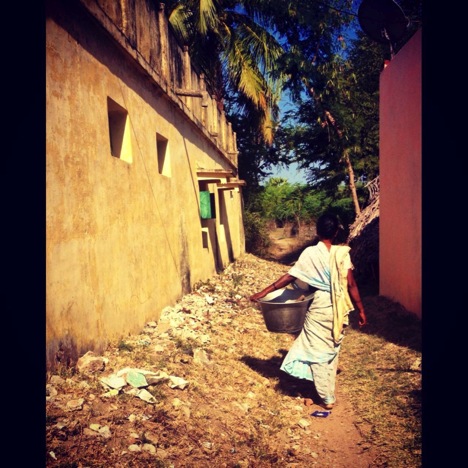Investigating marketplace literacy in India
April 9, 2014
I knew I was in a very different place as soon as I stepped out of the airport.
It was about 1 a.m. local time. I immediately spotted two stray dogs scavenging through trash on the ground. In the distance I saw a group of at least 20 people sleeping on a public lawn.
I boarded a bus that was greeted by a barrage of motorcycle horns as soon as it turned onto the main road. Looking out the window I saw an endless stretch of ramshackle roadside shops, characteristic of a developing urban area. I also spotted the first of what would be many cows walking on the side of the road.
This was not going to be a typical spring break.
I was among 18 University students who forwent the traditional college spring break to travel to southern India to promote marketplace literacy, as part of the Entrepreneurs Without Borders campus organization.
Get The Daily Illini in your inbox!
We flew to the city of Chennai and met up with MBA students from India’s SRM University. We were guided by a local team working as part of the Subsistence Marketplaces Initiative, directed by professor Madhu Viswanathan from the College of Business and India’s Marketplace Literacy Communities, a non-profit partner of Marketplace Literacy Project.
Our goal was to immerse ourselves in a subsistence culture, gain insight into the unique challenges that people were facing and present some possible solutions. I found the experience to be more eye-opening than anything I could have imagined, and it gave me new insight into the hidden challenges that make poverty such a difficult problem.
Our main destination was the rural village of Kadambur. We broke into four groups and spent several days interviewing various village residents including farmers, homemakers, entrepreneurs and village leaders.
My group focused on farmers. We learned through our interviews that water was their greatest concern. The success of their harvest is completely dependent on the amount of rain, and one bad harvest could make it very difficult for them to support their families without being forced to take a loan or pawn their few valuable possessions.
When asked what they did to combat this problem, they said that they simply go to the temple and pray for rain.
One farmer we interviewed told us that he uses the same farming methods that his father taught him. He told us that he knows about government-sponsored training programs, but he refuses to go to them because he does not trust the government.
These interactions illustrated the fact that people living in subsistence are focused on the present.
They are concerned only with providing their families’ immediate needs and are unable to take on the risk of innovation. They instead continue to use the same methods passed down from earlier generations that have been known to work.
We realized that enacting any kind of change would be difficult in this kind of setting because it would require combating this established mindset.
At this point I thought: If the people are satisfied with their current way of doing things, then why change it? Why not just let them be?
What I came to realize after talking to members of professor Viswanathan’s team is that while the villagers’ current way of doing things has worked up until now, changing economic and environmental conditions are threatening their future quality of life.
To illustrate from the farmer’s perspective: Soil fertility is declining as the land has been continually worked over the years (many of the farmers we interviewed admitted to having substantially lower yields). Meanwhile the cost of living in India is increasing as its economy grows, meaning that farmers will be unable to sustain their quality of living unless they can improve their business model.
Thus, we saw a huge opportunity to make a difference.
My group decided to present the concept of a value chain to farmers to help them understand how their crops reach the customer, and how possibly skipping links in the chain could allow them to be more profitable. We also suggested trying to store rainwater as well as using organic fertilizers to replenish the soil at a cheaper cost than what is commercially available.
The farmers were surprisingly engaged in our presentation, though they were skeptical of some ideas.
For instance, they pushed back strongly against our suggestion that they should come together to form an association, insisting there would be conflict. This highlighted the additional level of complexity that, as outsiders, we cannot possibly understand everything about their culture, and that they may have valid reasons to oppose ideas that may seem logical to us.
In spite of this additional challenge, these discussions were an important first step toward sparking new ideas that will lead to change in the future.
The most rewarding part of the trip was seeing the benefits to all parties involved — University students, SRM students and the villagers. However, it was clear that there is still a lot of progress to be made.
Entrepreneurs Without Borders hopes to maintain its relationship with SRM University to engage in future immersion experiences. Professor Viswanathan is continuing his efforts in India and has sought to expand his reach to Tanzania and Argentina.
Visiting India was unlike anything I have ever done before, and it gave me a new appreciation for the challenges involved in combating poverty. It also gave me hope that the desire of the Indian people to provide for their families along with the efforts of the Subsistence Marketplaces Initiative will lead them to a better quality of life.
Andrew Horton is a junior in Engineering and former Illini Media employee. He can be reached at [email protected].







